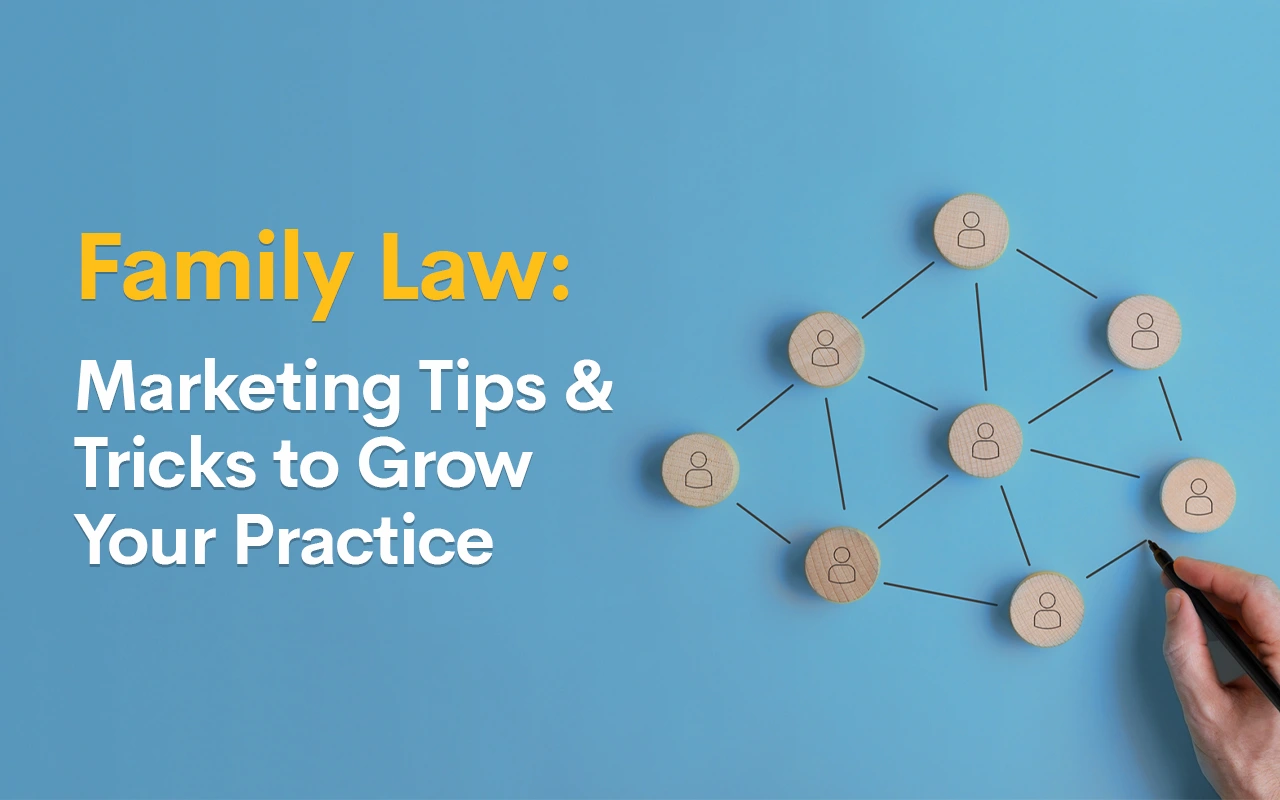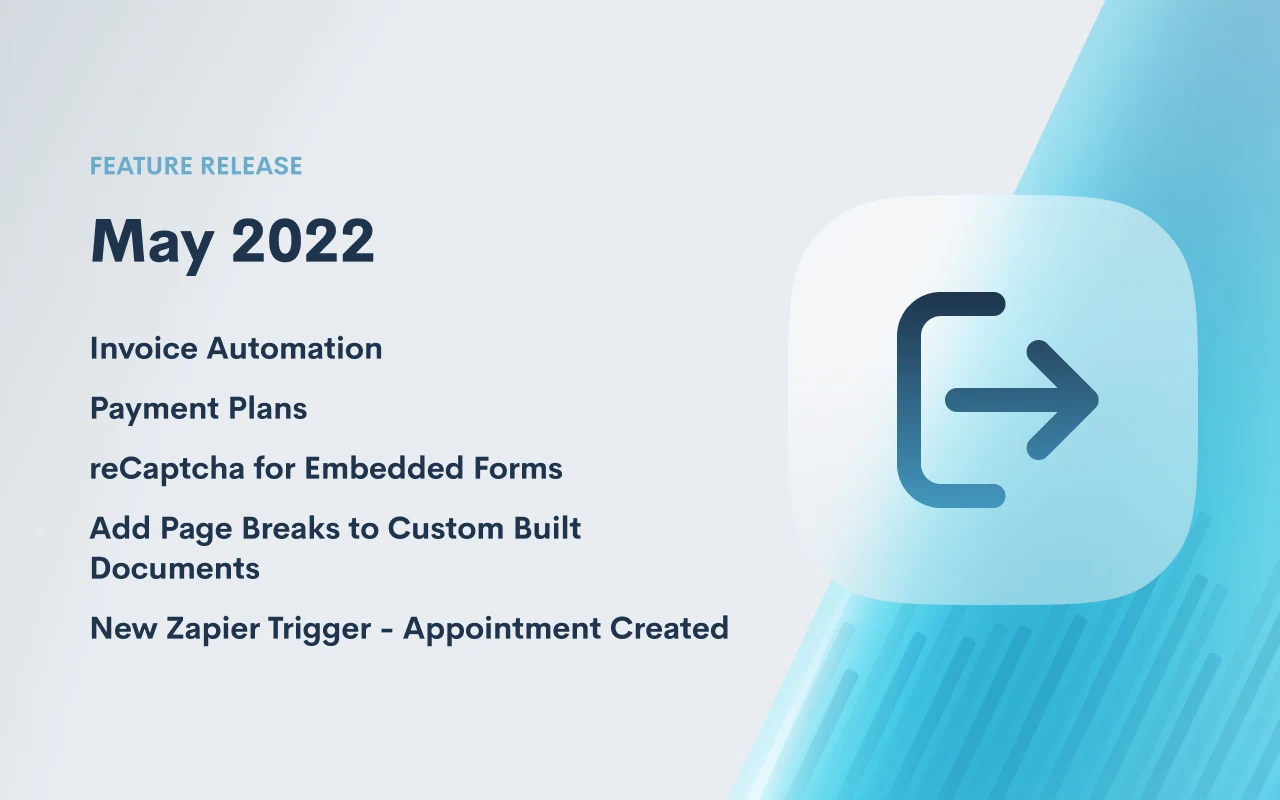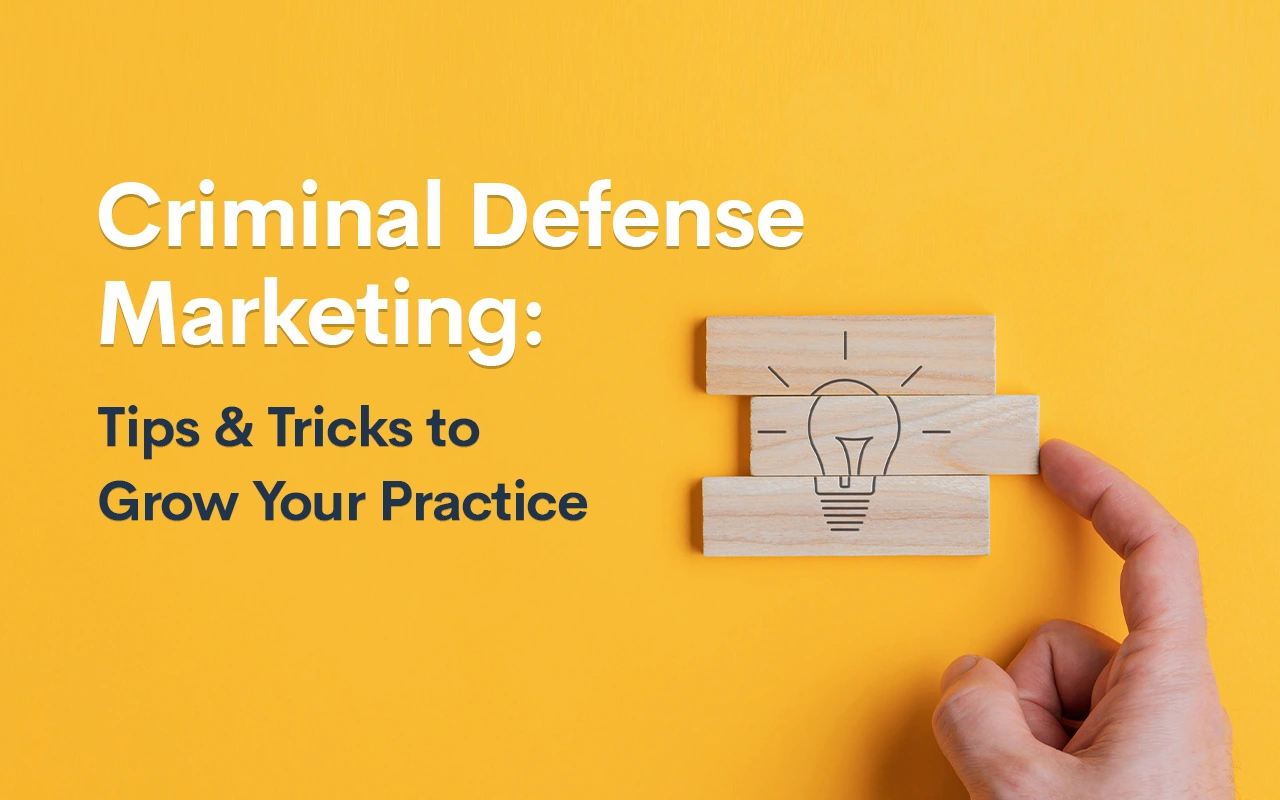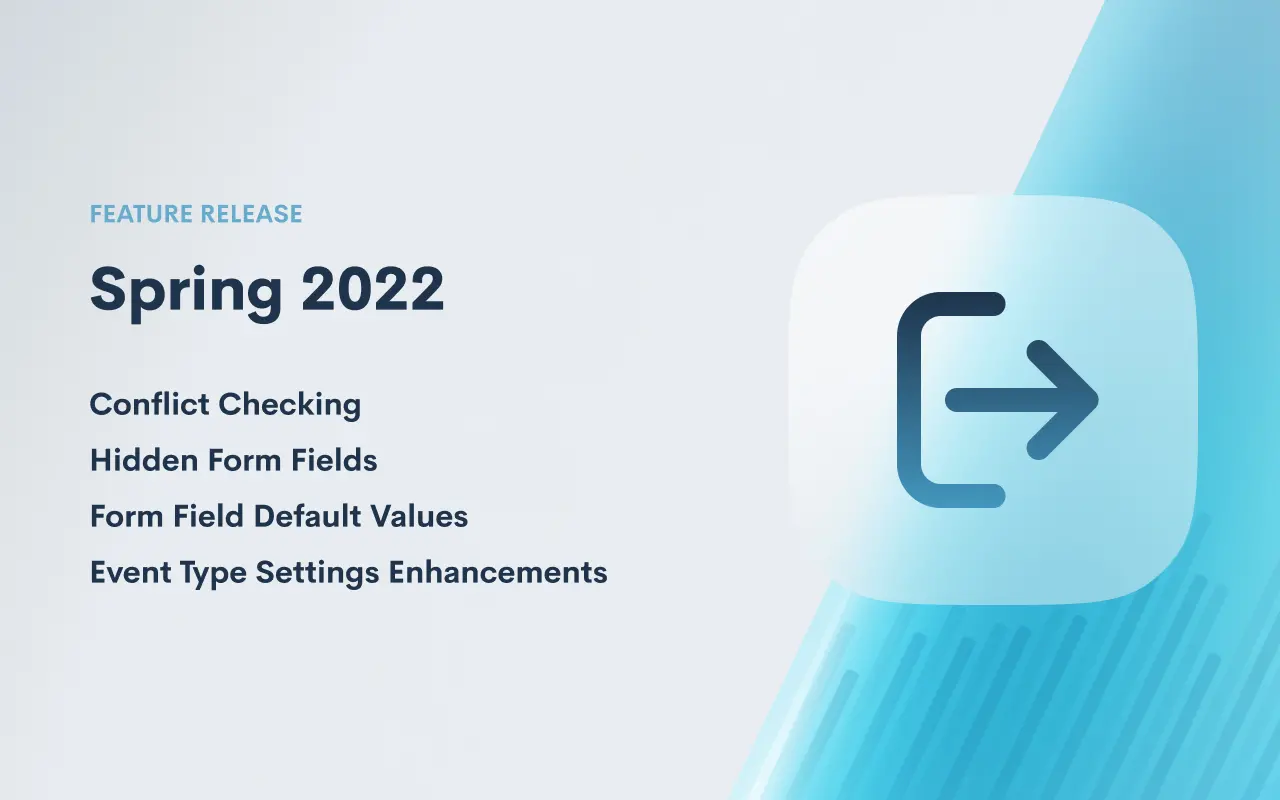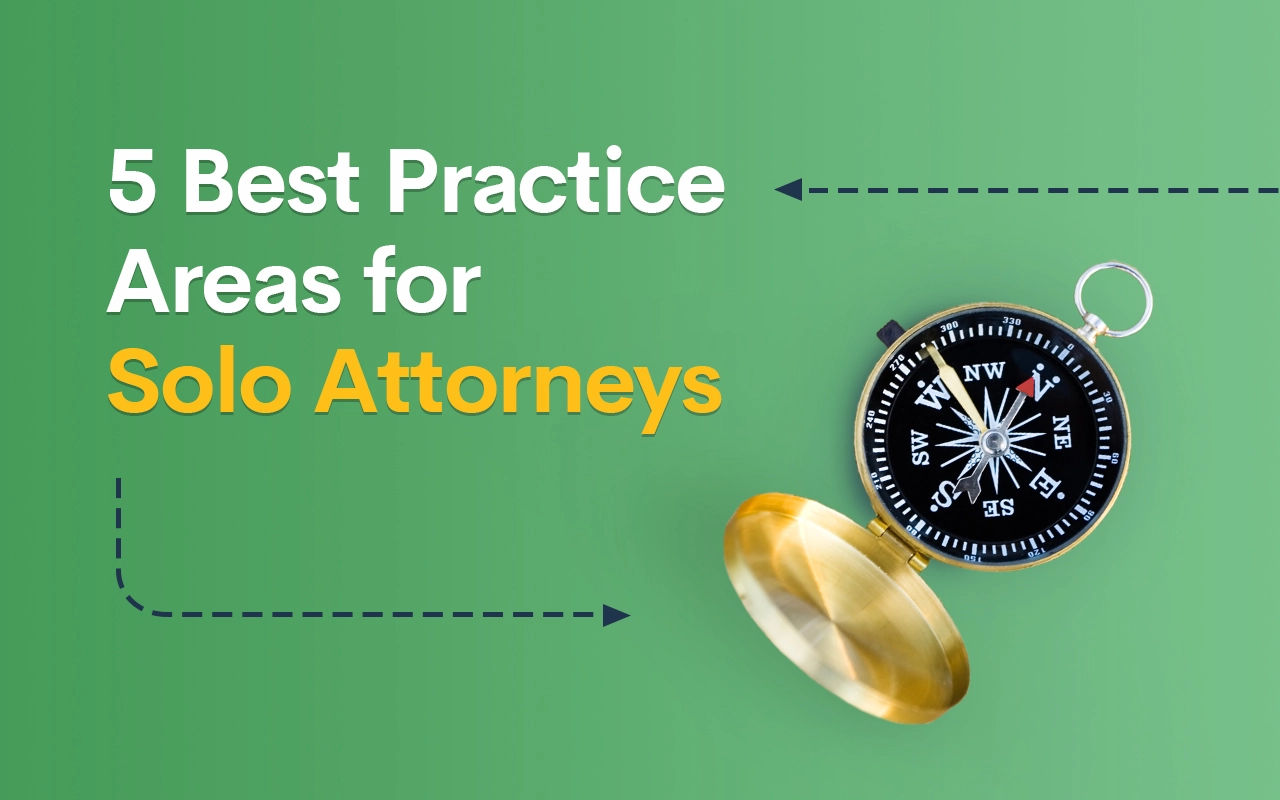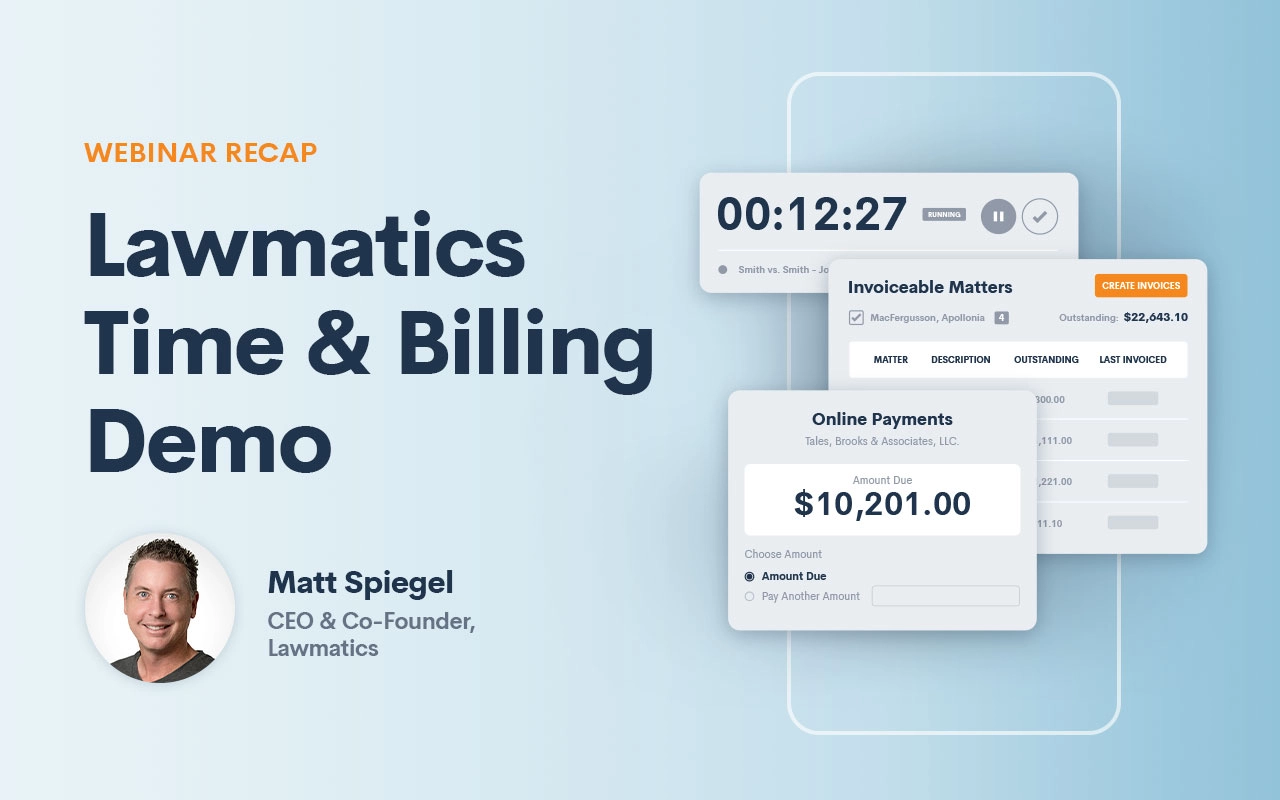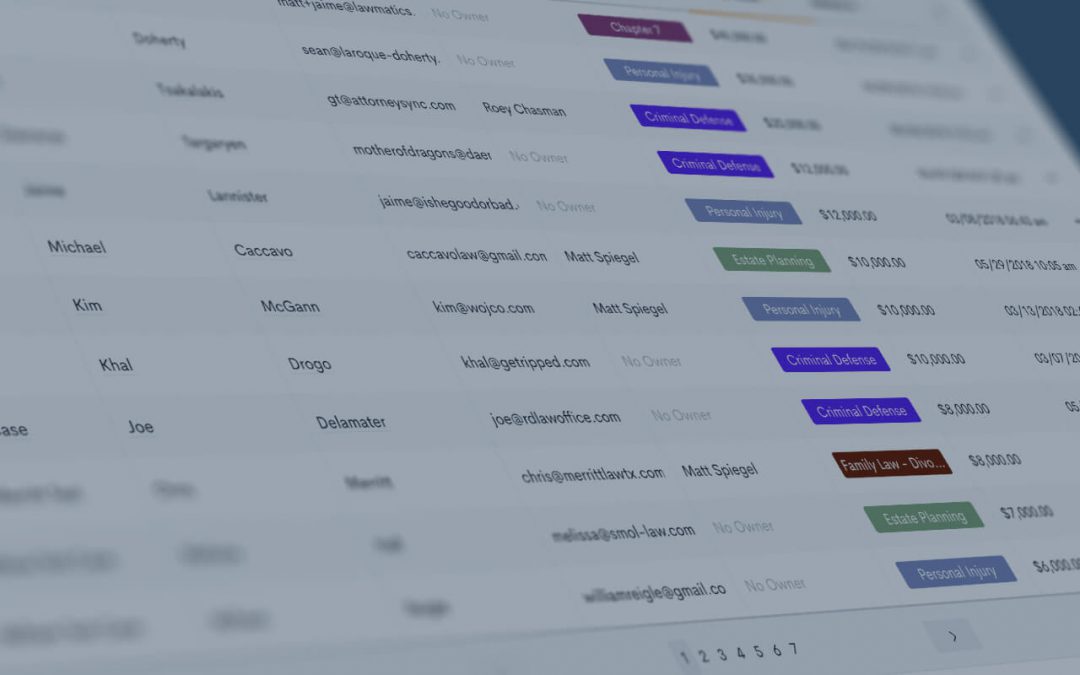From the outside, people often perceive a day in the life of a lawyer as a bracing scene in a southern courtroom starring a dapper Matthew McConaughey. Yet, despite Hollywood leaving you with the impression that lawyers spend their time arguing passionately in packed courtrooms, the truth is, it’s far from reality.
Any lawyer knows that in order to keep a law practice running, there are far more administrative tasks that need to be done than there are passionate courtroom scenes, and let’s face it; it’s hard to compete with the looks of Matthew McConaughey. In reality, the life of a lawyer involves responsibilities that aren’t just unglamorous; they can be downright burdensome.
While legal work is undoubtedly a part of your job as a lawyer, the demands of keeping everything organized far outweighs the time you spend in an actual courtroom.
From the minute a lead first contacts you to after the case is closed, each client has a specific file that gets thicker every day. Managing it all, following up with leads, and organizing cases can start to eat up your day in no time.
If only there were a magic button to do it all for you…
Introducing CRM Software Tools
Whether you’re a small law firm or a medium to large-sized one, you have to deal with a variety of clients and leads. At some point, keeping track of everyone’s information between your email inbox and spreadsheets becomes chaotic.
A CRM (customer relationship management) software helps you run your firm, keep your cases organized, track your leads, and even communicate with your clients, literally by the click of a button.
Legal CRM software reduces cumbersome paperwork and streamlines your work process so you can focus on billable work, totally revolutionizing the way you run your practice. Studies show that it can take up to 13 encounters for a lead to become a client. Why do this manually when you could rely on technology to do it for you? The result isn’t just less work for you, but improved client relationships and boosted revenue.
Attorneys specialize in law, not technology, so if you find yourself scratching your head over what the difference is between a legal CRM and practice management software, just know that it’s perfectly normal.
At first, they may both seem like the same thing from a distance, the same way that something like water and vodka do. But anyone who’s ever taken a swig of vodka can tell you it’s definitely not the same thing.
The best way to understand how each of these legal technologies differ is to know what their individual functions are.
What is a CRM?
CRM is a common acronym that almost everyone in the business and legal worlds have in their everyday vocabulary. However, if you ask 10 people for their definition of a CRM you will get 10 different answers. They will all have a theme of managing contacts but, as you dig deeper into the details, they will vastly differ, and it is these details that matter the most. Here are some of the most common perceptions of what a CRM does.
CRM Definition 1
CRM specifically stands for Customer Relationship Manager and is a tool used to manage a company’s relationship with its customers. This is a very broad definition and could certainly encompass a lot of concepts and functionality. Perhaps the most widely known example of a CRM, and what comes to mind for most tech minded people when they hear CRM, is Salesforce.
Salesforce certainly is a CRM, however, in many ways, the contact app in your mobile phone is also a CRM. It allows you to keep a list of contacts and maintain notes on those contacts. At its most basic level it too is a CRM.
CRM Definition 2
A CRM exists as a centralized database for a law firm that helps manage functions like client intake, scheduling consultations, and tracking revenue. While it may be perceived as simply a contact database, the truth is that it can do so much more.
If used correctly, the right legal CRM software is a methodical approach to managing your leads and contacts by automating and tracking the client intake process. From the very first moment that a lead fills out an online intake form to the minute the day they are paying clients, a law firm CRM software tracks and manages each step of the way, keeping you up to date at all times.
CRM Definition 3
“It’s basically the same as a practice management software—right?”
*Cue wrong answer buzzer*
CRM vs Practice Management: What's the Difference?
What is Practice Management?
Like a CRM, a practice management software, also known as case management software, also allows law firms to access contact information either on-premise or on a cloud. Its function is to help law firms manage their day to day operations more efficiently with less chance of error. From billing to legal document management, everything is all in one place without having to dig through multiple file cabinets to access what you need about your case.
It may sound a lot like a CRM but there are some fundamental differences that are important to mention.
Unlike a CRM, a case management software only handles existing client matters rather than focusing on client intake, lead conversion, and customer relationship management. Its purpose is to help you keep your cases organized and efficiently communicate with retained clients while you’re working on their matter.
Some examples of what a legal practice management software can do are:
- Matter Management
Easily track and manage case details without bothering with the headache of manual organization. A bird's eye view of where each case stands makes it possible to see who made changes when, so you can see details as they happen. - Task Management
Create tasks assigned to multiple lawyers with due dates for different cases. View all of your upcoming appointments and any important notes to remember. - Document Storage
Keep all of the documents and files you need for each client and case, from images to videos. - Billing
Track any unpaid bills and add interest to late payments. Categorize and stay up to date with financial records and reduce the risk of human error. Easily create customizable invoices and send them all out the same day.
The Main Differences Between The Two
Ultimately, a case management software provides basic functionalities for managing your current cases, by keeping everything organized and accessible from anywhere. Whereas a CRM for lawyers is designed to provide much more advanced functionalities that go beyond just current clients, but also past and future ones. It’s an all-in-one system to manage your sales funnel and boost the customer experience.
Different Yet Better Together
While some features are similar, ultimately, their purposes differ. Yet, despite serving distinctive purposes, your law firm functions stronger by using both in conjunction with the other.
A combination of a robust CRM paired with a practice management software is the best way to systematically handle your existing clients while targeting potential customers.
Lawmatics’ CRM Definition
Lawmatics definition is a bit more robust. While a CRM should be all about maintaining great custom relationships, we just think that extends far beyond keeping data on your contacts and notes on the interactions you have with them. To us, a CRM must allow you to do anything and everything to enhance that relationship, to help foster its growth. This means actions like sending emails, communications, even marketing emails to your contacts and/or customers. It isn’t just collecting data, it is fostering the relationships for you.
A good legal CRM is as much about providing a great customer experience as it is about managing the relationship. A great customer experience starts from the very first interaction that a possible new client has with your firm and continues all the way through the intake process, active case stage, and continues after their case is over. A good law firm CRM will maintain and foster the relationship from the moment of first contact and continue through all stages of a client’s life cycle.
Lawmatics cloud-based CRM software helps you keep in touch with your existing clients and potential leads by streamlining your processes and improving your communication as an alternative to spreadsheets.
Do I Need a CRM for My Law Firm?
So do you need a CRM? If you agree with our definition of a CRM then yes, you absolutely need to have a good CRM. You should always be mindful of the customer experience a client is receiving from start to finish. Too many firms focus just on one or two aspects. In our years of working with law firms we’ve seen many put so much care into the service they provide while a case is active, fewer who put the same focus on the client intake process, and virtually none who focus on the post case life cycle stage, perhaps the lowest hanging fruit.
A proper CRM for attorneys can help you provide excellent customer service at EVERY stage of the client life cycle. What’s more is that a good CRM will also allow you to automate most of these customer relationship managing actions. So not only will you provide a better customer experience, but you will also save yourself time and effort along the way. Providing an excellent experience takes a lot of thought and time. Attempting to do it on your own using a multitude of solutions duct taped together is not only expensive, but also likely to cost you valuable time, resources and will sacrifice some of that experience.
If you hope to grow your law firm, you can’t possibly do it alone. You’ll need a CRM in place to create an efficient system.
Some examples of what the right law firm CRM can do are:
-
Follow Up Automation
Something a bit more unique for law firms is the intake process. Lawyers have a specific process for bringing on a client and have more requirements than many businesses. It is critical that this intake process is seamless and designed to usher a potential client from first contact all the way through to hiring you. One of the most important features of a good law firm CRM is attorney intake software. Many CRMs out there do not address this concept of intake at all, let alone with enough focus to be viable for a law firm.
You can easily automate the entire client intake process through a CRM. No more digging through your email or scrolling through spreadsheets. With a CRM, your follow up process is on autopilot, so you don’t have to worry about whether someone has been called back or not. The end result isn’t just more lead conversion but greater overall client satisfaction.
-
Appointment Setting
In the old days, law offices had to go through timely back and forths trying to find the best time to meet with leads and clients, but not with a CRM. Easily sync your Outlook or Google calendar to your CRM so that leads can choose from only the appointments you want them to see.
Not only does it take the hassle out of the actual appointment setting process, but also appointment reminders. No more having to chase after leads to make sure they show up. A CRM software like Lawmatics sends an automatic reminder before the appointment, so you don’t risk losing valuable time.
Hassle-free appointment setting doesn’t just benefit you, but also your clients—in other words, everyone wins.
-
Document AutomationAny lawyer knows the complexities of making legal documents. Document automation allows you to easily create documents using custom fields tailored to your law firm's unique needs. Send the documents to clients instantly for an e-signature, saving you and your clients time.
- Reporting
The right CRM gives you total control over all of your data so that you can see where your firm stands at a glance. Lawmatics lets you choose the data you want to extract and use it in any way you need. Save your reports and stay on top of important information.
4 Big Benefits of Using a Law Firm CRM
1Improved Communication
As a lawyer, you are expected to communicate with your clients about everything from the progress on their case to their legal rights. At some point, a spreadsheet alone can’t handle it all. Law firm CRM software makes communication much easier by automation. One single program allows you to see where all of your cases stand at the same time. No more missed follow up opportunities or frustrated clients.
You can say goodbye to disheveled post-it's all over your desk, and disorganized inboxes with no real system set in place. Your CRM tells you exactly who needs to be contacted when, so you can focus on what matters most in your practice.
2Efficient Case Management
Depending on your firm, you may have multiple people working on a case. When several people are working on the same file, everyone must be on the same page. A customer relationship management solution makes it easy to manage the client journey in a centralized database.
CRM’s make it possible to easily track emails and documents, and see whether clients have been followed up with or not.
3Client Retention
As an attorney, it’s your job to make your clients feel acknowledged every step of the way, but it’s not always easy to give everyone your attention and make money at the same time. Legal CRM tools give your clients more direct access to you, building stronger relationships while still providing the tools for you to focus on what matters most.
Technology allows you to keep your hands free without sacrificing responding to your clients in a reasonable amount of time.
4Streamlined Workflow
Simple workflows make your life as a lawyer much easier so you can devote your time to the most pressing matters. Reduce time spent on manually completing administrative tasks and instead add them to your automated workflow. Workflows make it easy to fully control each stage of the client process with a modern and efficient approach.
8 Examples of CRM Tools
1Email marketing tools
Email marketing is a critical part of any business' marketing plan. While there are many email marketing tools out there, it is important to have your email marketing fully built into your CRM. This is the only way to ensure data seamless flows into your personalized emails.
Features like drip campaigns make it easy to streamline your client follow ups. By creating a repeatable process that sends a new email each time a lead or client moves to the next stage of the client journey, you ensure that you deliver consistent communication with a targeted yet personalized approach.
2Marketing Source Tracking
As you start to market your law firm more and more, it is very important to know where your leads are coming from. If you do not know what source your leads are coming from then you are effectively flying blind. It’s not recommended doing any marketing until you are set up to track where your leads are coming from.
Typically, this comes in the form of website and phone number tracking to ensure that all leads are properly sourced. A good CRM and intake management platform will take care of this for you.
3Managing Contacts
Make sure your CRM is not just a glorified rolodex. You are better off with a legal CRM that allows you to actually nurture and grow your relationships. The intake is an important part of the life cycle and you want a tool that will give you complete intake management and automation.
A great CRM allows you to assess where each contact stands at a glance. No need for manual digging through emails and spreadsheets for contact information. Keep everyone in your firm organized by keeping all of the information you need on each client and lead all in one unified place.
A CRM software like Lawmatics, which was created by an attorney, makes it possible to view your contacts by any criteria you need from case title to client stage, making it easy to manage your client’s journey step by step.
4Custom Reporting
What you put into a legal CRM and intake management platform is only as good as what you can get out. It is important that your law firm's CRM, intake and marketing automation platform allows you to report on any aspect of the data that keep on the platform. Metrics like sales numbers, ROI, lead source attribution, and pipeline value are critical to your law firm. Make sure that your CRM is up to par.
Solutions like Lawmatics are designed to eliminate the guesswork and manual labor associated with providing an amazing customer experience. Look for not just something that refers to themselves as a CRM, but also as a marketing automation platform. This is the solution that you need for your firm if providing a great customer experience at every stage of the customer life cycle is a priority for you, and if you are in the business of being a lawyer, it absolutely must be.
A CRM can gather data from your online forms and analyze it in any way that works for your law firm. Boost client engagement and expand your business by gaining insight through reporting tools, converting leads into clients, and strengthening client-attorney relationships.
5Client Responses
CRM’s make it possible to set up text messaging and email to reach your clients any time, anywhere. Whether it’s for a meeting reminder or requesting a document, a CRM keeps you in touch with your clients. In addition to easier client communication, you can also automate replies from lead follow up to an email newsletter. Automated replies mean less work for you, yet more cases.
6Calendar Syncing
A useful CRM tool makes it possible to connect your Gmail or Outlook calendar, keeping everyone up to date. Easily see upcoming meetings as well as meetings that have already taken place—no more wondering whether a meeting needs to happen or not.
7Appointment Setting
It’s incredibly frustrating to get stuck in a long thread email back and forth with clients trying to find the right time for everyone. Or perhaps you agree on a time to meet, and your client doesn’t even show up because they forgot. You lose valuable time and, in turn, revenue from inefficient appointment setting.
Does this sound familiar?
This is where a CRM comes in. It takes the headache out of setting appointments that everyone can stick to. Easily send a link to your leads and clients, which only shows your available appointment slots.
They can pick and choose the dates that work for them based on only what you want them to see. You’ll see a considerable drop in late meetings and client no-shows, allowing you to focus more on your billable work.
Best of all, before meetings, you can easily refer to your CRM to access your prospect’s data and notes before getting started.
8File and Document Storage
Quickly pull up any documents like proposals and contracts within your database. Having everything in place means you can refer to anything you need at a glance—no more digging through various programs and locations.
Your clients can easily upload files you need in an instant by following the link you send them. Say goodbye to printing bulky documents and let your CRM store them digitally.
How To Choose The Right Legal CRM
Any time that you’re choosing a CRM software in a sea of options, the first thing you should do is decide what you want to achieve. To get the most out of your CRM for your practice, you should look for one specifically designed for law firms as opposed to an agnostic CRM system.
Whether you’re a solo lawyer or on a team, the right software is essential for the future growth of your firm. Knowing the specifics of what you need out of your CRM is the first step to making sure you find the right match.
Your legal practice customer relationship management software should meet your expectations and provide a polished experience that supports the pursuit of your success.
The Right Features
Make sure that you read each feature carefully before diving into a decision. It’s important to note that some software is better suited for specific practice areas or firm sizes.
However, it’s safe to say that regardless of your practice area, any CRM you choose for your law firm should have the following features:
- Custom Detailed Data
- A User-Friendly Interface
- Client Relationship Insights
- Integrations
- Automated Workflow
- Automated Form Builders
Great Customer Service
Making the switch to a law firm CRM is a process. It’s critical that you choose a program that offers customer support when you need it. From basic tips to specific questions you need answers to right away, a good CRM should have excellent customer support to get the most out of it.
Customer Stories
Get to know what other customers' experiences are with the CRM software you’re considering. Get acquainted with what people say the pros and cons are. Ask other lawyers in your area of practice what kind of CRM they’re using. Do all this, and chances are you’ll find a perfect fit.
Pricing
It goes without saying that price plays a critical role in the choice you make. The initial investment should be well worth the growth in revenue that a good CRM helps you achieve. Compare prices and features to get a feel for what you’re willing to pay for.
Who Can Benefit The Most From a CRM?
Law Firms Looking For Better Communication
If your practice is struggling to wear multiple hats throughout the day, then its no wonder why your clients may feel there’s a lack of communication. After all, it’s hardly possible to do all of the administrative work required of you in addition to finding leads and marketing to current clients— all while practicing law. The only way to optimize your clients’ experience and communicate efficiently with them is through a CRM.
A CRM makes it possible to do it all at once, without you actually having to do it all at once. While you focus on getting the best outcomes for your clients, your CRM sends automatic replies to your other clients and customers, boosting the customer experience.
Law Firms Looking For a Faster Document Process
Legally binding documents require a lot of energy that can take hours to days to complete if you want to ensure they’re error-free. A CRM provides a shortcut with easy and fast document automation.
Custom fields make it possible to fill out redundant contracts in a fraction of the time, and send them back in even less time. With no need for downloading or printing, the entire client intake process goes much more smoothly—moving your clients cases along with speed.
Law Firms Looking For Stronger Marketing Tools
A smart law firm knows that every lead and client is an opportunity for revenue. The only way to stay visible is to send consistent marketing emails. Yet, email campaigns alone aren’t enough to guarantee leads will bite since people don’t appreciate an all-in-one law firm marketing approach.
A law firm marketing software filters clients so that they get the right kind of message based on their unique needs— which means better results for your marketing efforts.
Law Firms Looking For More Referrals
Clients who were tracked every step of the journey with consistent communication are the ones that are most likely to refer your practice to their friends and colleagues.
With a legal intake software, you never have to worry about important steps being forgotten. A CRM makes it easy to grow your network by giving your clients a reason to brag about you.
Law Firms Looking For More Efficient Scheduling
There isn’t a single lawyer out there who doesn’t know the headache of trying to find the right time that works for everyone. Lengthy email back and forths trying to schedule appointments wastes everyone’s time.
Lawmatics custom self-scheduling software takes the hassle out of scheduling by giving clients and leads direct access to your calendar.
How a CRM Can Help You Grow
Your Law Firm
Ultimately, your goal as a legal practice is to grow as much as possible—so it’s no surprise why “how can I grow my law firm?” is one of the most commonly searched Google questions for lawyers. If your firm is struggling to gain traction, then a solution is more critical than ever.
Many of the culprits holding you back may be easily solved by incorporating an organized system into place. The answer is simple—you can grow your firm with a CRM.
More Money Saved = More Revenue
The more work that starts piling up, the more you might be inclined to hire more staff. But, let’s face it, you likely already have limited resources as it is, and paying another salary is a significant investment. A CRM is a fraction of the cost of hiring more staff, and in many ways, even more efficient.
If you’re looking for a cost-effective solution for handling everything in your firm, then look no further than a legal CRM. You can focus on growing your firm while a CRM handles your tasks, tracking each client on autopilot.
Better Customer Service = Better Reviews
Nowadays, customers expect more than ever, and the only way you can meet current demands is by revolutionizing the way you handle customers.
It goes without saying that a firm looking to stand out in the competitive legal industry needs to master its customer service approach. A CRM responds to your clients immediately, goes over any vital information that needs to be covered before your appointment, and even sends personalized messages wishing clients anything from happy birthday to congratulating them on their new product launch.
If you want to expand your law firm on a wider level, the only way to do that is by fostering your relationships with clients, and a CRM can do that for you.
Better Marketing = More Clients
A typical law firm reaches out to leads whenever they find a moment, rather than at the exact time they’re ready to buy. With the right technology on your side, prospects get contacted at the perfect time.
Without a CRM, you can’t be sure that you can get back to every lead quickly enough before they move on to a competitor. Reaching leads immediately means more lead conversions, and more money in your pocket.
More Opened Emails = More Visibility
Email campaigns alone aren’t enough to take your firm to the next level. An all-in-one marketing approach won’t yield the same results as a more personalized approach. With an attorney CRM, you can target your leads and clients into specific groups using audience segmentation.
By delivering tailored marketing, leads will be much more likely to open and read your emails, which means increased visibility for your law firm.
Better Insights = Better Improvement
Growth starts with knowing who your most profitable clients are and where they’re coming from. You should know who your strongest performing staff members are and where you have room for improvement.
Yet, without data, trying to find your firm’s weak points is just guesswork. With the custom reporting and insights feature, you can take a closer look at the bottlenecks in your practice and generate the results you’re after.
Growing your practice requires knowing what’s happening from the inside out—and a CRM can tell you that.
More Efficient Processes = Cases Moving Along Faster
It’s not uncommon for lawyers to send documents off to clients to be signed only to find themselves waiting for days. Since clients have to bother with scanners and printers to send back signed documents, it’s no wonder why it can be a challenge to send back quickly. Unfortunately, the longer it takes to get cases rolling, the less potential you have for growth.
With e-signature software, however, the ball is continuously rolling. With your cases constantly in motion, your firm will continue to grow, bringing in more revenue.
Being Goal-Driven = Meeting Your Growth Goals
When you become a goal-driven firm, you make the commitment to follow your room for improvement by measuring where it counts. Rather than aimlessly hoping for the best, goal tracking makes it possible to focus on essential data points to ensure you’re making progress.
Goal-tracking keeps you accountable for your goals and keeps you on track. No more guesswork trying to find the best strategies for growth. Analytics arm you with the knowledge to make informed decisions based on actual data, not speculation.
Less Stress = Better Performance
A common stereotype is that lawyers are cold and distracted. After all, who can blame them? It’s often a rude surprise for lawyers to get out of law school and realize that being a lawyer is so much more than just practicing law. They have to run a business and find their own clients on top of getting favorable results for their cases.
A CRM takes the headache out of the business aspect of running a law firm so you can focus on what you’re best at— practicing law! That means a better version of yourself and better services delivered.
When your clients feel like you gave their case their full attention, their experience will be that much better. The less you have on your plate, the more you can take on, and the better of a lawyer you can be.
Efficiently Serve Clients and Grow Your Firm’s Revenue with a CRM
Eliminate tedious day-to-day processes in your legal practice and deliver quality client experiences with CRM. Ideally, you should find a CRM that exceeds your expectations. Lawmatics is the industry leader in CRM software. Since the software was developed by an attorney, it’s an expert solution that’s easy to use yet incredibly robust.
Beyond just CRM tools, Lawmatics also provides marketing automation tools, client intake automation, customizable insights, and more, making it the most powerful choice for law firms.


